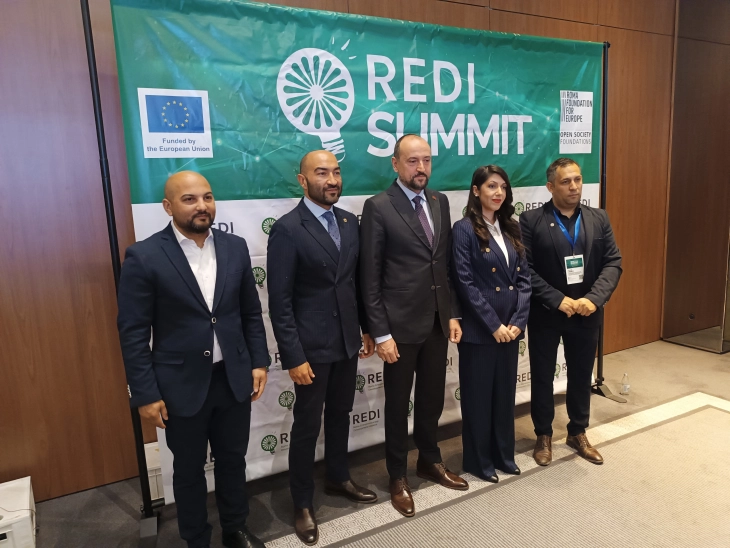Skopje hosts REDI Summit 2024
- The third edition of the REDI Summit entitled "Roma Inclusivity in Green & Digital - Innovation and Environmental Equity" is taking place in Skopje on Wednesday.

Skopje, 28 February 2024 (MIA) – The third edition of the REDI Summit entitled "Roma Inclusivity in Green & Digital - Innovation and Environmental Equity" is taking place in Skopje on Wednesday.
"Despite historical marginalization and discrimination, Roma entrepreneurs have shown resilience and have adeptly utilized the opportunities presented by transformative movements to play a crucial role in advancing sustainable development," event organisers said.
Nadire Redjepi, Deputy Director for Western Balkans, REDI Network underlined that this year’s summit is focused on green and digital agenda.
"The summit’s goal is to facilitate dialogue and exchange of knowledge and practices regarding the major challenges and opportunities encountered by Roma entrepreneurs, the Roma community, the unemployed, and young Roma. Through this dialogue, our aim is to develop recommendations and solutions contributing to economic growth and development within the Roma community, especially in addressing these global trends exacerbating the inequality between Roma and non-Roma," Redjepi said.
Petrică Dulgheru, the executive director of REDI network, gave a brief overview of the network's achievements so far. He also extended gratitude towards the summit attendees and their keen interest in the event's agenda.

Caretaker Deputy PM for Economic Affairs, Fatmir Bytyqi, emphasized the Government's commitment to supporting initiatives that promote inclusive growth and digital empowerment, highlighting the importance of utilizing technology and innovation to create opportunities for all.
"We need to break down barriers and embrace differences," Bytyqi emphasized at the summit.
According to Bytyqi, today's summit will highlight the importance of inclusivity in the green and digital transformation of the economy, as well as the need for greater collective commitment to finding innovative solutions for increased Roma inclusion in these processes.
He underscored the government's strong commitment to building systemic sensitivity towards diversity, inclusion, and constructing a society for all, formalized through the National Strategy for Interculturalism and Social Cohesion 2024-2026 as well as the National Roma Strategy 2022-2030, developed and adopted in line with the guidelines of the EU Roma Strategic Framework.

He also highlighted the National Development Strategy 2024-2044, which, through an inclusive process, managed to involve over 14,000 citizens, representatives from academia, business sectors, civil society, and nearly all political parties in its formulation.
“This strategy was approved at yesterday's government session and is now entering the legislative process for adoption. The formulation of this strategy ensured inclusion for all individuals regardless of their diverse beliefs, convictions, identities, or affiliations, including the Roma community,” Bytyqi added.

Gjoko Velkovski, Minister for Labor and Social Policy in the caretaker government, highlighted the government's efforts to tackle social inequalities and promote economic inclusion of Roma people.
“The Ministry of Labor and Social Policy is strongly focused on tackling unemployment in the country by creating and implementing employment policies. Additionally, it consistently develops measures specifically aimed at employing vulnerable groups of unemployed individuals, including the Roma,” Velkovski said.
According to Velkovski, employment of vulnerable groups of unemployed individuals, “including Roma people, largely relies on active employment measures planned annually within the framework of annual operational employment plans.”
“In 2023, through active employment measures outlined in the operational plan for active employment programs and measures and services on the labor market, a total of 542 Roma individuals were included in active employment measures. Among them, 232 were employed through measures leading to direct employment, such as self-employment with grants for opening their own businesses, salary subsidies, and the employment and growth of legal entities. As the best example of significantly increased Roma participation, the employment and growth measure of legal entities leading to direct employment stands out, with 148 Roma individuals included. This is in contrast to 2021 and 2022 when only 22 and 33 Roma individuals, respectively, were involved,” Velkovski said.

Velkovski said that in line with European Union trends for the development of digital and green economies, measures such as "support for creating new jobs through green investments" are being implemented within employment operational plans. These measures aim to foster the creation of employment opportunities while catalyzing the green transformation of the private sector by introducing green products, services, technologies, or processes in enterprises.
Additionally, Velkovski stated that "training for advanced IT skills" is being introduced to enhance the skills of unemployed individuals in information technology, thus boosting their competitiveness and facilitating faster integration into the job market.
He emphasized that the participation of Roma individuals in these measures is insignificant.
“In 2023, two Roma individuals were involved in the green measure, and three Roma individuals participated in the advanced IT skills training measure. A similar situation occurred in 2022. This reality underscores the urgent need for more proactive involvement from all stakeholders committed to enhancing Roma inclusion in society. I want to underline that the Roma community has been and will remain a focus of the country’s policies. They are an essential part of our multicultural society and in the future, we should all contribute to their quality integration in all spheres of social life,” Velkovski said.
Photo: MIA







